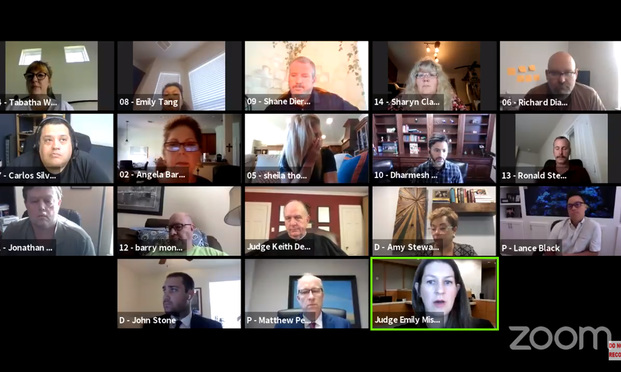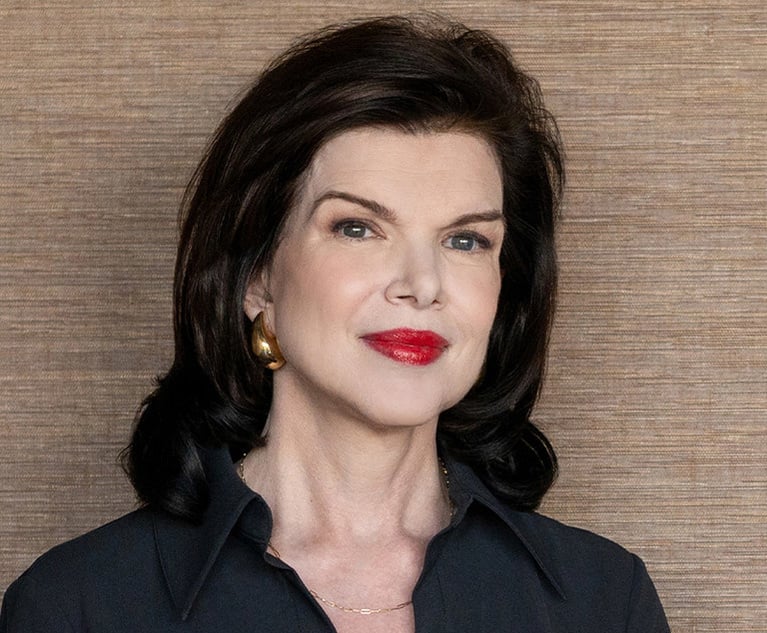Juror Walks Off to Take Phone Call as Texas Tests First Jury Trial Via Zoom
In what may be a first across the United States since the coronavirus pandemic canceled jury trials, Texas judges on Monday invited a jury pool to a court proceeding over video teleconference. Monday's hearing in an insurance dispute was actually a "summary jury trial," which is an alternative dispute resolution process.
May 18, 2020 at 12:54 PM
4 minute read
 Judges and lawyers in Texas picked a jury remotely over Zoom video conference, for a "summary jury trial," an alternative dispute resolution proceeding in which parties get a one-day jury trial, followed by mediation. Photo: YouTube
Judges and lawyers in Texas picked a jury remotely over Zoom video conference, for a "summary jury trial," an alternative dispute resolution proceeding in which parties get a one-day jury trial, followed by mediation. Photo: YouTube
In what might be a first across the United States, Texas judges on Monday invited a jury pool to a court proceeding over video teleconference.
And they found jury selection unfolded pretty seamlessly over about an hour and a half, with only one hiccup: A juror wandered off screen during a break and couldn't hear the judges calling him back. Senior Judge Keith Dean said it was the digital version of at the courthouse, when court staff occasionally have to track down a juror in the hallway taking a phone call.
As the coronavirus pandemic shuttered courthouses across the nation this spring, Texas emerged as a leader in embracing Zoom video conferences for judges to continue holding court proceedings remotely. Texas judges have already been using the technology for bench trials—but a jury trial is another matter.
'Courthouse has come to you'
Monday's hearing in an insurance dispute was actually a "summary jury trial," which is an alternative dispute resolution process in which the parties participate in a one-day jury trial, followed the next day by a mediation session to attempt to settle the dispute. The jury selection was livestreamed on YouTube, and the rest of the proceeding was private.
"For centuries, if you had jury duty, you have to go to the courthouse. In this case, the courthouse has come to you," said Dean, a senior judge and mediator in the Dallas-Fort Worth region who previously served as judge of the 265th District Court and the Dallas County Criminal Court No. 5.
For the first 30 minutes of the proceeding, 470th District Judge Emily Miskel of Collin County welcomed all of the 26 prospective jurors—another three people failed to report to jury duty—and asked what type of device they were connecting with, and patiently walked them through how to set up their their audio and video correctly.
Miskel, who only participated in the proceeding to handle the technological aspects of the Zoom meeting, added that she appreciated those prospective jurors who had called her office to make sure their jury duty summons was not a scam.
Attorneys Matthew Pearson, founder of Pearson Legal in San Antonio, and senior associate Valerie Cantu, were representing the plaintiff.
"This is as strange for us as it is for you," Pearson told jurors.
Pearson explained that his client, Virtuwave Holdings, owns a building in McKinney that suffered hail damage in March 2017. The company is suing its insurance company, State Farm Lloyds, alleging that it did not pay the benefits that it should have paid. Virtuwave seeks money damages from State Farm, Pearson told jurors during voir dire.
Defense counsel Amy Stewart, partner in Stewart Law Group in Dallas, and associate John Stone represent State Farm.
Stewart said, "How exciting is this that we all get to experience this together for the first time—we know in Texas—but maybe even in the country?"
Approaching the bench
During the jury selection process, the attorneys questioned only 12 prospective jurors at a time. Miskel created a Zoom "breakout room" for the other 14 prospective jurors.
For the first group, the lawyers on both sides went through lists of questions about prospective jurors' views about insurance companies, their personal knowledge of the hail storm in question and more.
Dean then asked the attorneys to approach the bench. How? Miskel created a separate breakout room just for the judge and counsel.
When they came back, a hiccup: One of the prospective jurors had wandered off-screen and could be heard talking on the phone. No response when the judges told him to come back, since his computer audio was hooked into headphones he was not wearing.
Finally, the man returned, and Dean announced that the attorneys for both sides had picked that first group of 12 jurors, which meant the 14 people who had been in a separate breakout room all along were "free to go about your day," Dean said.
Related stories:
Judges Rush to Learn Video Conferencing as Shelter-In-Place Orders Spread Across Texas Metros
This content has been archived. It is available through our partners, LexisNexis® and Bloomberg Law.
To view this content, please continue to their sites.
Not a Lexis Subscriber?
Subscribe Now
Not a Bloomberg Law Subscriber?
Subscribe Now
NOT FOR REPRINT
© 2025 ALM Global, LLC, All Rights Reserved. Request academic re-use from www.copyright.com. All other uses, submit a request to [email protected]. For more information visit Asset & Logo Licensing.
You Might Like
View All
Vinson & Elkins Expands Environmental Team with Chair of Texas Commission on Environmental Quality
4 minute read
Nondisparagement Clauses in Divorce: Balancing Family Harmony and Free Speech
6 minute read
Houston Trial Lawyer Mary-Olga Lovett Leaves King & Spalding to Open Boutique
3 minute read
Trending Stories
- 1Relaxing Penalties on Discovery Noncompliance Allows Criminal Cases to Get Decided on Merit
- 2Reviewing Judge Merchan's Unconditional Discharge
- 3With New Civil Jury Selection Rule, Litigants Should Carefully Weigh Waiver Risks
- 4Young Lawyers Become Old(er) Lawyers
- 5Caught In the In Between: A Legal Roadmap for the Sandwich Generation
Who Got The Work
J. Brugh Lower of Gibbons has entered an appearance for industrial equipment supplier Devco Corporation in a pending trademark infringement lawsuit. The suit, accusing the defendant of selling knock-off Graco products, was filed Dec. 18 in New Jersey District Court by Rivkin Radler on behalf of Graco Inc. and Graco Minnesota. The case, assigned to U.S. District Judge Zahid N. Quraishi, is 3:24-cv-11294, Graco Inc. et al v. Devco Corporation.
Who Got The Work
Rebecca Maller-Stein and Kent A. Yalowitz of Arnold & Porter Kaye Scholer have entered their appearances for Hanaco Venture Capital and its executives, Lior Prosor and David Frankel, in a pending securities lawsuit. The action, filed on Dec. 24 in New York Southern District Court by Zell, Aron & Co. on behalf of Goldeneye Advisors, accuses the defendants of negligently and fraudulently managing the plaintiff's $1 million investment. The case, assigned to U.S. District Judge Vernon S. Broderick, is 1:24-cv-09918, Goldeneye Advisors, LLC v. Hanaco Venture Capital, Ltd. et al.
Who Got The Work
Attorneys from A&O Shearman has stepped in as defense counsel for Toronto-Dominion Bank and other defendants in a pending securities class action. The suit, filed Dec. 11 in New York Southern District Court by Bleichmar Fonti & Auld, accuses the defendants of concealing the bank's 'pervasive' deficiencies in regards to its compliance with the Bank Secrecy Act and the quality of its anti-money laundering controls. The case, assigned to U.S. District Judge Arun Subramanian, is 1:24-cv-09445, Gonzalez v. The Toronto-Dominion Bank et al.
Who Got The Work
Crown Castle International, a Pennsylvania company providing shared communications infrastructure, has turned to Luke D. Wolf of Gordon Rees Scully Mansukhani to fend off a pending breach-of-contract lawsuit. The court action, filed Nov. 25 in Michigan Eastern District Court by Hooper Hathaway PC on behalf of The Town Residences LLC, accuses Crown Castle of failing to transfer approximately $30,000 in utility payments from T-Mobile in breach of a roof-top lease and assignment agreement. The case, assigned to U.S. District Judge Susan K. Declercq, is 2:24-cv-13131, The Town Residences LLC v. T-Mobile US, Inc. et al.
Who Got The Work
Wilfred P. Coronato and Daniel M. Schwartz of McCarter & English have stepped in as defense counsel to Electrolux Home Products Inc. in a pending product liability lawsuit. The court action, filed Nov. 26 in New York Eastern District Court by Poulos Lopiccolo PC and Nagel Rice LLP on behalf of David Stern, alleges that the defendant's refrigerators’ drawers and shelving repeatedly break and fall apart within months after purchase. The case, assigned to U.S. District Judge Joan M. Azrack, is 2:24-cv-08204, Stern v. Electrolux Home Products, Inc.
Featured Firms
Law Offices of Gary Martin Hays & Associates, P.C.
(470) 294-1674
Law Offices of Mark E. Salomone
(857) 444-6468
Smith & Hassler
(713) 739-1250






